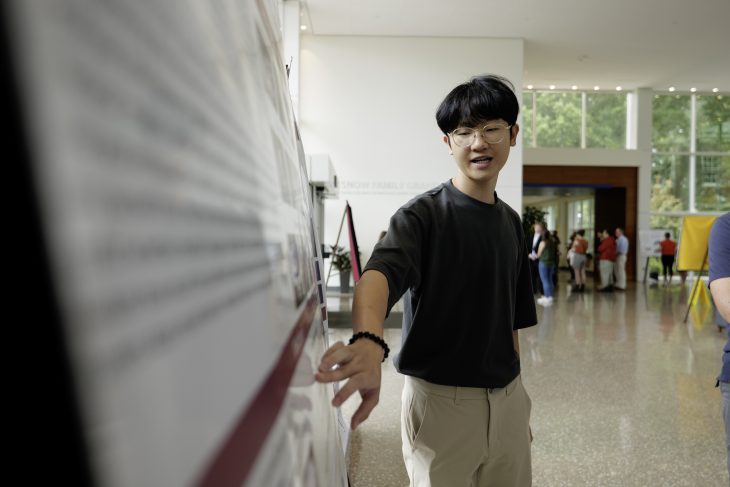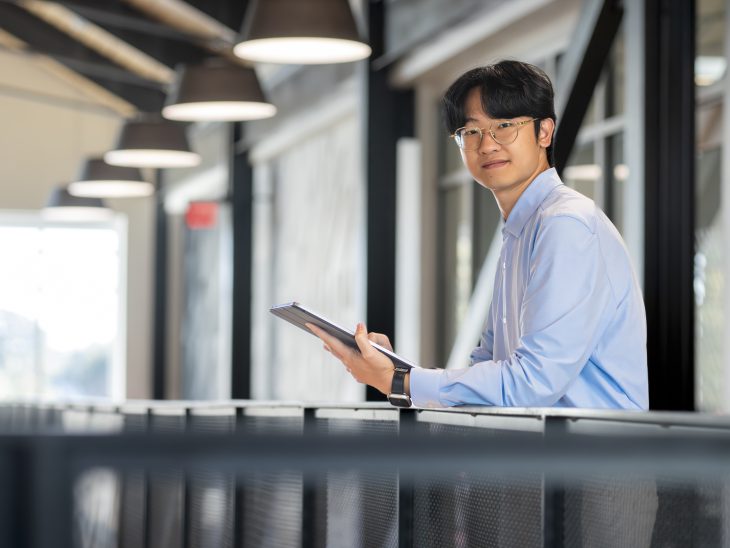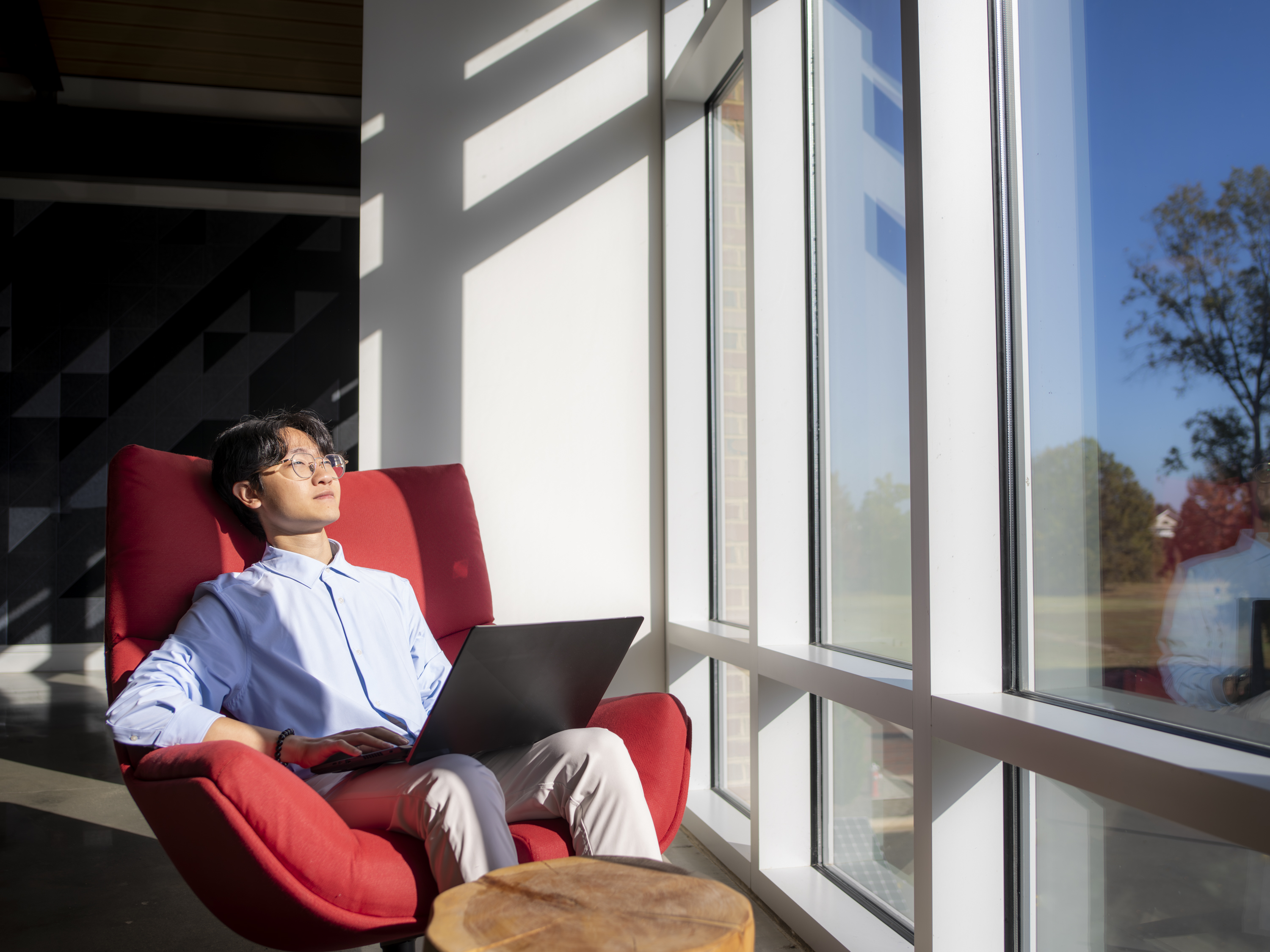Throughout October and November, Elon University is celebrating first-generation student stories with the 2024 First Generation Celebration. Archie Tan ’25 came to the U.S. alone at age 13. Now a Lumen Scholar researching AI’s use in cancer diagnoses, he’s showing that being a first-generation student is a strength.
Moving to college is often the first time students are sent out to live independently. Zhuohao (Archie) Tan ’25 had a similar experience much earlier in his life – coming to the U.S. alone in search of a better education.
At 13 years old, Tan’s parents sent him from his native China to live in New York City with an uncle who he’d only met a few times. While learning English, Tan worked hard to excel academically and landed a spot at a public university in New York. Neither of his parents held a four-year degree, making him a first-generation student, so there was a lot to consider when thinking about a college education.
“My parents couldn’t pay for my college in the U.S., and my uncle had his own family to support,” said Tan, who has monthly video calls with his parents but has not seen them in person since moving to the U.S. “I could barely afford it. There were a lot of struggles with my immigration status, so I was not able to work. I saw people graduating from the same school, with the same immigrant status and a 4.0 GPA, and then working jobs like fixing bicycles. So, it made me feel very hopeless.”
He then discovered the Golden Door Scholars program, a national scholarship program for undocumented students who are often ineligible for federal financial aid. It was through the scholarship that Tan discovered Elon – one of the Golden Door partner schools.
“Elon is very strong from a research perspective,” said Tan “I can’t work, so why not use all of my skills by doing research?”
Closing the gap
Tan is now a computer science major at Elon and a recipient of the Lumen Prize, the university’s highest research award. Working alongside Scott Spurlock, associate professor of computer science, Tan is researching how to detect pancreatic cancer early using artificial intelligence (AI).
“Archie is really self-motivated and takes ownership of his research,” said Spurlock. “He brings his own ideas and goals to our meetings, and then we work together to figure out the best next steps to move the project forward. Sometimes research progress can be unpredictable and frustrating, but Archie maintains a sense of optimism and focus on making things work better.”
According to Tan, using AI to detect cancer is becoming popular, but it’s important to expand the data the AI technology uses. Using AI, Tan is creating fake CT scans of what a pancreas would look like in the early stages of cancer and then combining it with a real scan to train the AI.
“Technology is growing fast and I see a lot of places where technology is focusing on business,” said Tan. “I’m interested in closing the gap between technology and health care so we can help people, lower the workload of doctors and nurses, and help save lives.”

Building resiliency
As a first-generation student, just getting to college was a challenge itself, not to mention the challenges that came from undertaking undergraduate research focused on a complex topic. “There’s a lack of opportunities compared to people who are not first-generation and people who started doing research in high school, so it’s very competitive. When your parents never went to college, it’s hard to know what to do to get to a certain place, like graduate school,” said Tan.
But it hasn’t stopped him from diving into the Elon experience. Tan is the president of the Undergraduate Research Student Association, he’s an academic coach at Elon Academy, a member of the Elon Society of Computing, the programming team, Asian-Pacific Student Association and Phi Kappa Phi honor society. He’s now looking at jobs in the tech industry and is considering a master’s or doctoral program after getting some work experience. All his accomplishments have roots in his first-generation status.
“Being first-generation builds up your resiliency,” he said. “That resiliency will help you longer than those who may have had a higher starting point and their parents took care of them throughout their whole path.”

Celebrating first-gen students
Throughout October and November, Elon University is celebrating first-generation student stories with the 2024 First Generation Celebration. The first-generation celebration kicked off on Oct. 16.
First-Generation Student Support Services at Elon also helped Tan along the way. The office offers a variety of services to create a campus that empowers, supports and celebrates first-generation college students, including the First Phoenix Peer Mentoring program, which connects incoming students to upper-level students.
“Mentorship is very important,” said Tan. “Your parents don’t have bachelor’s degrees, so they don’t know what you’re experiencing in school, and they might not be able to provide you with any advice. Being a mentor, you also learn and pick up some communication skills. It’s also interesting to learn about the other peoples’ lives and how people might choose different paths.”
Tan’s mentee, Sophia Barnes ’28, said he has been incredible during her transition to Elon. “I applied to be a first-generation mentee because I was looking for someone who I could turn to and who would understand what it is like to be in my shoes,” said Barnes. “He has proven to be that and even more. Not only has he been able to answer all of my random questions but he has given me so much advice on things that I didn’t even think to ask.”
The 2024 First Generation Celebration concludes on Nov. 8, National First-Generation College Student Celebration Day, which honors the anniversary of the signing of the Higher Education Act of 1965 that expanded access to higher education for young people from historically marginalized backgrounds. Visit a full list of First-Generation Celebration events for more details.



